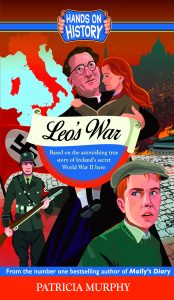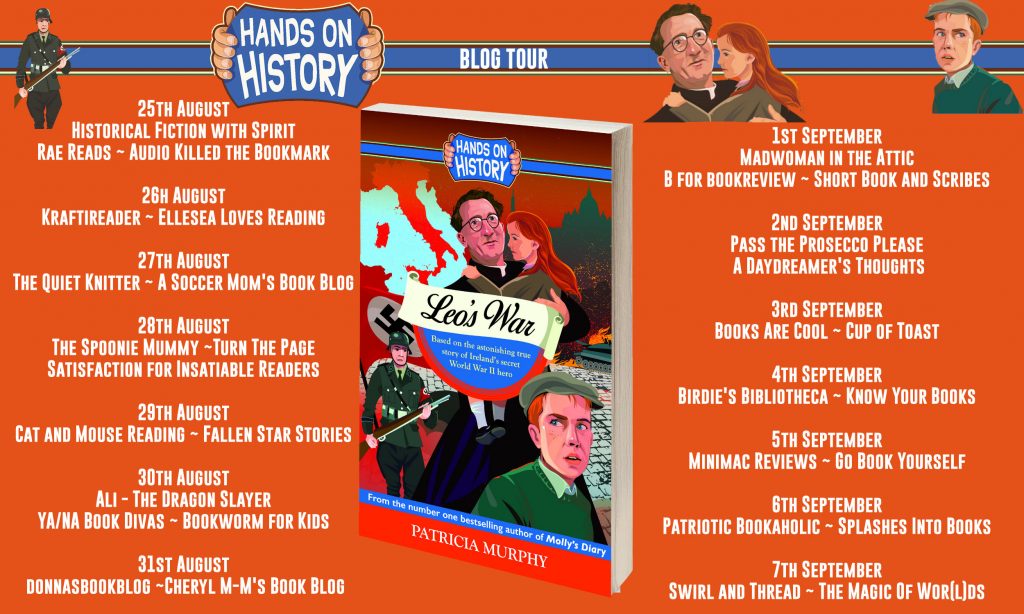
Leo’s War by Patricia Murphy (& Giveaway)
Leo’s War by Patricia Murphy
Hi All!
Today is my stop on the blog tour for Leo’s War and I am here today with information about the book, a guest post from the author and a giveaway!
Writing Leo into the Nazi Occupation of Rome
Leo’s War is the story of the Nazi occupation of Rome written through the eyes of a twelve-year-old boy. This is my fourth novel written in the first person so I clearly feel drawn to telling the story in this fashion.
I feel children get written out of history so giving their version of events is a way of evening the balance. I also find it appeals to children. History can seem very remote to young people – something handed down from on high. But they don’t feel patronized by another child who takes them on a perilous journey. The narrative voice is friendly and chatty bringing the reader into the heart of the action. Journalism is often claimed to be the first draft of history. But diaries and first person accounts can be more revealing. They don’t pretend to know everything and can help us understand what it felt like to live through war and destruction.
It’s also a way into astonishing historical events without being beaten over the head with dates and facts. And it is a familiar form. Children and teenagers often write diaries and letters during war. The Diary of a Young Girl by Anne Frank, one of my favourite books as a child is full of humanity but also the every day concerns of a teenager, such as will she ever have a boyfriend and how annoying her mother is. Who could not love a girl who hidden in an attic could say, “How wonderful it is that nobody need wait a single moment before starting to improve the world.”
One of the most powerful accounts of living in Sarajevo through the Bosnian war was Zlata’s Diary, written over three years. Zlata began it when she was an 11-year-old with perfect grades. It ended with hiding in shelters as 330 shells a day smashed into the city. Unlike Anne Frank, Zlata survived and the success of her diary became her ticket to freedom. She now lives in Dublin and works in documentary, a remarkable woman and advocate for children in conflict.
In an era of Social Media, the first person account, re-versioned as a blog and even tweets, have become mediums full of message. It is not just a personal lifeline but has transformed foreign reporting and world events.
“I had a terrible dream yesterday with military helicopters and the Taliban . . .” wrote Malala in her anonymous blog for the BBC at the age of 11 in 2009. After surviving a near fatal assassination attempt, and winning the Nobel Prize for Peace, Malala is now an icon, an activist for girl’s education and tolerance. But it all began with a blog.
New voices emerged from Syria, such as teenager Marah who wrote from Damascus as her country fell apart.
“Today, spring is here again. But what kind of spring is this? We now wake up to the sound of falling bombs . . . Why were our childhoods stolen?”
It is heartbreaking to read how children yearn for bananas and candy. Marah escaped to Switzerland and marriage to an older man. I hope she has found peace.
During the siege of Aleppo in the Syrian War, the world was gripped by the tweets of a seven-year old girl, Bana Alabed. She wrote with honesty of the horrors of war and even penned an open letter to Donald Trump. There were accusations that the tweets were a propaganda stunt written by the girl’s mother, an English teacher, despite investigations that proved their veracity. But there is no denying the immediacy of messages such as,
“I’m very afraid I will die tonight.” —Bana Alabed, Twitter, October 2, 2016
“Stop killing us.” —Bana Alabed, Twitter, October 6, 2016
My novel blends fact and fiction and for me it’s all about a cracking story. The Monsignor was a real character, an Oscar Schindler style hero who saved six and a half thousand Prisoners-of-War, partisans and Jews from the Nazis. His courage was astonishing.
As the residence of the pope, Vatican City was neutral and soon became a magnet for fugitives seeking refuge. It wasn’t official papal policy but the Monsignor worked in tandem with the British ambassador who had taken refuge in the Vatican during the war and the Swiss papal legate to set up the Rome Escape Line. He disguised them as nuns and priests and ordinary Italians, and took them hiding places all over the city from ordinary homes to palazzos. He was partial to the odd disguise himself and became known as the “Pimpernel of the Vatican” for his exploits. Kappler, the Nazi commander was obsessed with him and there were several attempts to capture him.
It was a compelling story but how to tell it for a young readership? It came alive for me when I had a visual image of Leo and his sister. He was pushing her up a hill and he had a black eye. Ruby was disabled with cerebral palsy and he was fiercely protective of her. Then it was a case of discovering Leo’s narrative voice. It makes it sound like I’m a medium channeling voices, but his personality came through loud and clear as I began to write. Stubborn, funny, utterly loyal. Leo was a survivor.
Leo and his family are imaginary but are based on a mash-up of real scenarios and people forged together in my imagination. Leo who is half-Jewish and half-Irish, is trapped with his mother and disabled sister in Italy as war breaks out. When their mother is arrested for being part of the Resistance, Leo will do anything to protect Ruby from the Nazis and that’s why he seeks out Monsignor Hugh O’Flaherty at the Vatican.
The bond between Leo and Ruby is one of the drivers of the plot. She has Cerebral Palsy, a condition identified since antiquity. But it was on the list of conditions that made a child vulnerable to euthanasia in Hitler’s Germany, then later on the death camps. Their close link is one that I’ve seen many times between siblings who are differently-abled. I have worked in television for many years as a documentary maker and I have made quite a few documentaries about disability. I created a Channel series called Born to Be Different following six babies born with disabilities at the turn of the millennium. And also worked on another groundbreaking series for BBC2 called Children of Helen House about children with life-limiting illnesses. Ruby is inspired by the many astonishing children I’ve met who overcome the odds to achieve so much.
I was also interested in how children see the war and their survival strategies. Leo is a joker, he makes up rude songs and enjoys telling jokes. This was even a subversive activity at the time. People were executed in Germany for telling jokes about the Führer. Mussolini had no sense of humour either. Dictator never do. Ruby meanwhile loves and fairies and folklore and see magic in everything and it helps her cope.
One message always emerges loud and clear from children and young people living through conflict. The enemy isn’t just the other side but war itself. As Zlata Filopovic eloquently expressed it, “Daily, children like me, like us, around the world, go into cellars and hiding places, into refugee camps or into the army. With them goes the future of their countries and of the world.” Leo would surely agree!
Reference links
Anne Frank – The Diary of A Young Girl
Stolen Voices: Young People’s War Diaries from World War One to Iraq by Zlata Filipovic is published by Penguin
Zlata’s Diary by Zlata Filipovic published by Puffin Books
Malala’s original blog
Marah’s Diary is published as a collaboration between Rookie online magazine and SyriaDeeply
Dear War: A Syrian Girl’s Story of War and Plea for Peace by Bana Alabed
About the Book
 It’s 1943 and young Leo tries to protect his disabled sister Ruby as the Nazis invade Italy. After his mother is arrested, he turns to Monsignor Hugh O’Flaherty to save them. But he is no ordinary priest. Known as ‘The Pimpernel of the Vatican’, the Monsignor is the legendary organizer of the Rome Escape Line. Soon Leo is helping out with this secret network dedicated to saving the lives of escaped prisoners of war, partisans and Jews. But as the sinister Nazi leader Kappler closes in on the network, can Leo and his sister stay out of his evil clutches?
It’s 1943 and young Leo tries to protect his disabled sister Ruby as the Nazis invade Italy. After his mother is arrested, he turns to Monsignor Hugh O’Flaherty to save them. But he is no ordinary priest. Known as ‘The Pimpernel of the Vatican’, the Monsignor is the legendary organizer of the Rome Escape Line. Soon Leo is helping out with this secret network dedicated to saving the lives of escaped prisoners of war, partisans and Jews. But as the sinister Nazi leader Kappler closes in on the network, can Leo and his sister stay out of his evil clutches?About the Author
 Patricia Murphy is the bestselling author of The Easter Rising 1916 – Molly’s Diary and Dan’s Diary – the War of Independence 1920-22 published by Poolbeg.
Patricia Murphy is the bestselling author of The Easter Rising 1916 – Molly’s Diary and Dan’s Diary – the War of Independence 1920-22 published by Poolbeg.
She has also written the prize-winning “The Chingles” trilogy of children’s Celtic fantasy novels. Patricia is also an award winning Producer/Director of documentaries including Children of Helen House, the BBC series on a children’s hospice and Born to Be Different Channel 4’s flagship series following children born with disabilities. Many of her groundbreaking programmes are about children’s rights and topics such as growing up in care, crime and the criminal justice system. She has also made a number of history programmes including Worst Jobs in History with Tony Robinson for Channel 4 and has produced and directed films for the Open University.
Patricia grew up in Dublin and is a graduate in English and History from Trinity College Dublin and of Journalism at Dublin City University. She now lives in Oxford with her husband and young daughter.
Giveaway
Giveaway to win a £30 Amazon Gift Voucher (Open to UK Only)
*Terms and Conditions –Worldwide entries welcome. Please enter using the Rafflecopter box below. The winner will be selected at random via Rafflecopter from all valid entries and will be notified by Twitter and/or email. If no response is received within 7 days then I reserve the right to select an alternative winner. Open to all entrants aged 18 or over. Any personal data given as part of the competition entry is used for this purpose only and will not be shared with third parties, with the exception of the winners’ information. This will passed to the giveaway organiser and used only for fulfilment of the prize, after which time I will delete the data. I am not responsible for despatch or delivery of the prize.



One Comment
Pingback: